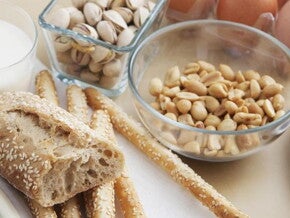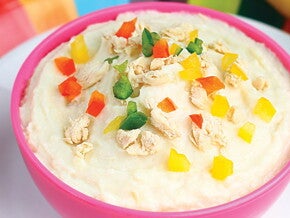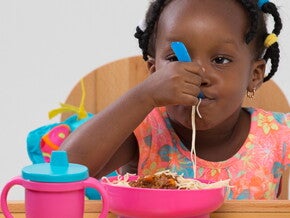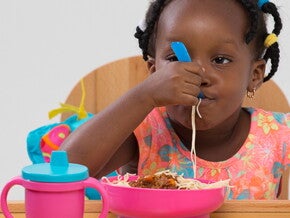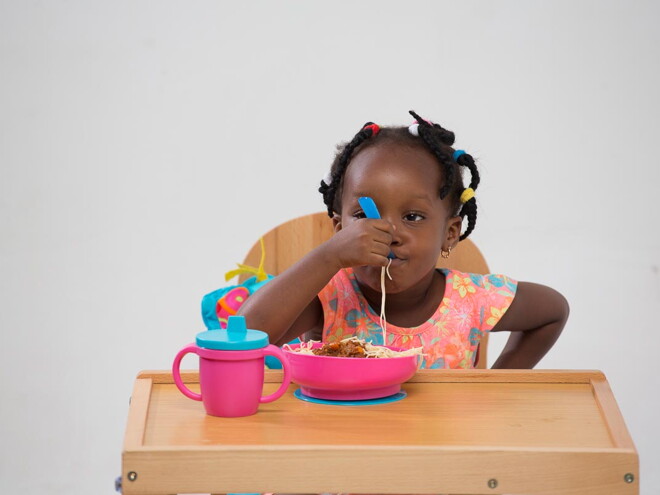
Feeding Tips for Older Babies
Your baby is now used to eating solids and may be grabbing at the spoon or picking up food by herself. This means she is ready for more self-feeding, a whole new messy adventure! Click here to learn More
Breast milk is still an important source of nutrition throughout the first year and up to 2 years and beyond.
New flavours
Continue to offer new foods plenty of times. Building healthy eating habits now may last a lifetime. New foods are often rejected at first but by offering them a number of times prepared in different ways, many of the foods will be accepted. And why not show baby how it’s done by including healthier food choices into meals for the whole family. If you find that your baby is rejecting a new food, seeing others enjoy the food may help encourage her to try them for herself.
Here are some foods that you can start to try if you haven’t already:
- Other dairy products such as yoghurt
- Family foods, as long as they’re mashed or chopped into bite-size pieces and light on seasoning
- Pasta, rice, toasted breads
- New fruits: mashed or finely chopped banana, pawpaw, peeled and diced mangoes
- New vegetables: steamed, bite-sized carrots and cucumber
- Protein: cooked and finely chopped eggs, minced meat, poultry, boneless fish and beans
Pump-up meals with iron
As you continue to introduce baby to new foods, don’t forget to offer 2 servings of iron-rich foods each day. Meat, meat alternatives and iron-fortified infant cereals are all great choices when looking to ensure iron is included in your baby’s diet. Serving vitamin C-rich foods along with plant-based iron foods aids in iron absorption.
New food textures
Continue to introduce new textures to help baby to develop her oral and motor skills. Begin to serve your baby finely chopped or minced foods and work up to offering soft foods cut into small pieces to encourage self-feeding Watch out for potential choking hazards
Time to eat
Your older baby should be offered 3-4 meals each day. Try to eat as many meals together as a family with your baby so that she can enjoy the social aspects of eating and learn good eating habits from others. This is also an opportunity for the rest of the family to show her how much they enjoy eating healthy foods such as vegetables. Depending on her appetite, 1-2 snacks per day should also be offered. Healthy nutritious snacks are the best way to keep your little one happy and energized until her next meal.
Hunger and fullness cues
Just like before you started your baby on solid foods, your little one has ways of telling you when she wants more food and when she’s done. By learning to recognize these signals, you can help your little one to develop healthy eating habits. Remember, your responsibility is to offer food and it is your baby’s responsibility to decide how much or whether she eats.
Here are some hunger and fullness cues that are common in babies from 8-12 months of age:
Hunger Cues
- Reaches for food
- Points to food
- Gets excited when food is presented
- Expresses desire for certain foods with words or sounds
Fullness cues
- Starts eating more slowly
- Clenches mouth shut or pushes food away
- Shakes head to say “no more”
Introducing a cup
Whether you’ve been breastfeeding or bottle-feeding you may want to consider introducing a cup. While it is ideal to get your little one drinking out of an open cup, many parents opt to introduce a sippy cup for when you and your little one are on the go. Learning to drink from an open cup is challenging and will require you to assist in holding the cup at first. Your patience will be worth it, as babies enjoy learning new skills and healthcare experts recommend this progression to a cup early in life, in order to help prevent early dental cavities.
This new skill can also be messy, and wet. When offering an open cup, put enough liquid for a few sips so that less goes down her face and on the floor. Another good tip is to put water in an open cup and leave other beverages for the sippy cup so that when it ends up on the floor, high-chair and your baby, it won’t be a sticky mess. Be patient and positive.
Feeding tips
- Introduce new foods one at a time - waiting 2 days before trying another food - to make sure your baby doesn’t have an allergic reaction.
- Choking is still a danger. All foods have the potential to cause choking, so ensure that your child is seated and well-supervised while eating.
- Eat as a family whenever possible and set a good example by incorporating healthy foods on everyone’s plates.
- Learn your baby’s hunger and fullness cues and trust that she knows when she is hungry or full.
- Transition to an open cup in a controlled environment, such as at the dinner table.
- Encourage self-feeding with finger foods
Learn more on your older baby nutrition











